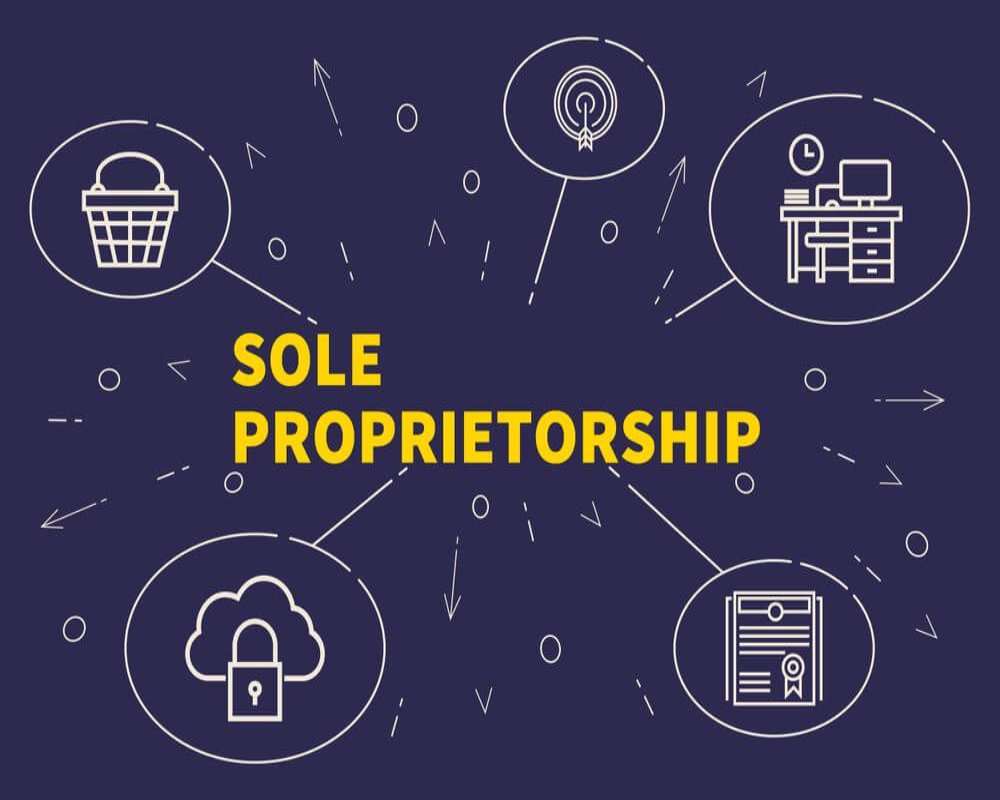Introduction
A sole proprietorship is a form of business ownership where a single individual owns, manages, and controls all the operations of the business. It is the most basic and unincorporated form of enterprise, where the business and the owner are legally the same entity. There is no legal distinction between the proprietor and the business. All profits generated by the business belong exclusively to the owner, and similarly, all risks, liabilities, and obligations must be borne by them personally.
This business model is widely used due to its simplicity, low cost, and minimal regulatory requirements. In India, it is commonly adopted by small traders, service providers, freelancers, artisans, and other self-employed individuals. While it may not be suitable for high-growth or high-risk businesses, it remains the backbone of the informal and micro-business sector in the economy.
Characteristics of a Sole Proprietorship
Single Ownership and Control
A sole proprietorship is owned by one individual who has total authority over the business. There is no separation between the business and the owner. The individual makes all decisions related to business planning, investment, operations, pricing, customer engagement, and expansion. This gives the business owner full freedom and autonomy, allowing for quick and efficient decision-making without needing approval from partners or a board of directors.
No Separate Legal Entity
Legally, the sole proprietorship does not exist separately from its owner. This means the business cannot sue or be sued, own property, or enter into contracts in its own name. All legal relationships must be entered into by the proprietor personally. As a result, the law views the business and the individual as one and the same. This characteristic leads to a blend of personal and business identities in legal and financial matters.
Unlimited Liability
One of the most significant features of a sole proprietorship is the unlimited liability of the owner. If the business incurs debts or legal obligations, the owner is personally responsible. This means that personal assets such as savings, property, or vehicles can be used to repay business debts. Unlike private limited companies or LLPs where liability is limited to the amount invested, the sole proprietor is exposed to complete financial risk.
Profit and Loss Retention
In a sole proprietorship, the owner receives all the profits generated by the business. There are no shareholders or partners to share the earnings. At the same time, the proprietor alone bears all losses. This feature makes the business highly rewarding in terms of direct profit but equally risky during financial downturns. The incentive of retaining the full profit often motivates proprietors to work harder and grow their businesses.
Ease of Formation and Dissolution
Starting a sole proprietorship is extremely simple. There are no mandatory legal formalities for formation. An individual can begin operations with basic documents such as PAN, Aadhaar, and bank account, along with specific licenses like GST registration or Shop and Establishment registration if needed. Similarly, closing the business is equally simple. There is no need for formal winding-up procedures, and the owner can simply stop operations and settle outstanding obligations.
Minimal Regulatory Compliance
Sole proprietorships are not governed by any central business registration authority such as the Ministry of Corporate Affairs. They are not required to follow complex compliance procedures or submit annual returns unless registered under GST or falling under tax audit limits. This makes it easier for small businesses to function without the burden of excessive paperwork. The proprietor needs to file individual income tax returns, and GST returns if registered, which simplifies tax compliance.
Personalized Customer Interaction
Because the owner is closely involved in all aspects of the business, including sales and service, customers often receive personalized attention. This helps in building strong relationships, customer loyalty, and trust. Many successful small-scale businesses rely heavily on word-of-mouth referrals and personal engagement, which is easier to manage in a sole proprietorship setup.
Capital Limitations
A sole proprietor typically relies on personal savings, borrowings from family and friends, or bank loans for funding. The ability to raise large amounts of capital is limited because the business cannot issue shares or bring in partners without changing its structure. This restricts the growth potential and makes it difficult to scale operations quickly. It is one of the reasons why many sole proprietors later convert their business into a private limited company or LLP as it expands.
Lack of Business Continuity
The existence of a sole proprietorship is closely tied to the life and health of the owner. If the proprietor becomes incapacitated or passes away, the business may cease to operate unless it is taken over informally by someone else. There is no concept of perpetual succession, as seen in corporate entities. This lack of continuity makes long-term planning and succession management a challenge for sole proprietors.
Flexibility and Adaptability
Due to its simple structure and direct control, a sole proprietorship is highly flexible and adaptable. The owner can quickly respond to market changes, adopt new strategies, or shift focus without going through layers of approval or regulatory procedures. This makes it an ideal business form in dynamic or uncertain environments where quick response and low overheads are crucial.
Conclusion
A sole proprietorship is a straightforward and accessible business model suited for individuals who wish to run their own venture independently. Its defining features include full ownership and control, no separate legal entity, unlimited liability, and ease of formation. While it offers autonomy and minimal compliance, it also exposes the proprietor to financial risks and growth limitations. Despite these challenges, sole proprietorship remains a vital component of the Indian and global business landscape, especially among small enterprises, freelancers, and self-employed individuals. Understanding its characteristics helps entrepreneurs make informed decisions about whether this model suits their business goals and risk appetite.
Hashtags
#SoleProprietorship #BusinessBasics #Entrepreneurship #SmallBusiness #BusinessStructure #SelfEmployed #BusinessOwnership #StartupTips #FinancialIndependence #BusinessCharacteristics #SoloEntrepreneur #BusinessAdvice #LegalStructure #TaxBenefits #BusinessGrowth #OwnerOperated #BusinessSuccess #IndependentBusiness #BusinessEducation #EntrepreneurTips


0 Comments